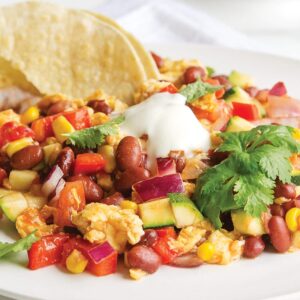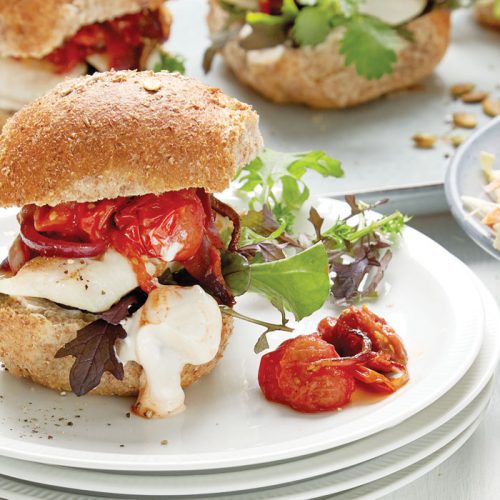
Including the following in your diet will help your immune system stay on top form, and help you recover faster from illness.
1. Vegetables
Veggies are packed with antioxidants, including polyphenols, which can help fight inflammation. Orange and dark green vegetables contain beta-carotene, which is converted into vitamin A. This helps to keep the membranes of our mouths, throats, nasal passages, lungs and skin in good condition, to help physically block the entry of invading bacteria and viruses. Dark green vegetables, peppers/capsicums and potatoes also provide vitamin C for stimulating the formation of antibodies.
- Have at least three servings per day.
2. Fruit
Berries of all descriptions contain vitamin C and give us myriad polyphenols and other antioxidants believed to have anti-inflammatory effects in our bodies. Apples and pears give us soluble fibre to help control blood sugars.
- Have at least two servings per day.
3. Wholegrain starchy carbs
Whole grains are great for fibre, which appears to lower C-reactive protein (CRP), a substance in the blood that indicates inflammation. Choose wholemeal bread, pitta and wraps, brown pasta and brown rice, and wholegrain cereals such as porridge, Weet-Bix (Weetabix) and Shredded Wheat. These foods also contain vitamin E, along with minerals zinc and selenium. Vitamin E is an antioxidant that helps to zap free radicals and may improve immune function, while zinc aids healing and is vital for internal immune system cells. A lack of selenium, meanwhile, appears to dampen immune system function.
- Have one serving at every meal.
4. Lean, protein-rich foods
Protein is crucial for a strong immune system as protein helps to keep our membranes healthy, along with all the major cells and organs of the immune system. Go for eggs, low-fat dairy foods such as skimmed milk, low-fat fortified soya milk, tofu, pulses such as beans, lentils and peas, nuts and seeds, lean chicken, fish and occasional lean red meat.
- Have one serving at every meal.
5. Nuts
Studies have linked nuts with reduced markers of inflammation. Nuts give us protein, fibre and vitamin E, and brazil nuts are especially high in selenium.
- Have a 30g handful as a snack between meals each day.
6. Oily fish
Fish is great for protein and also omega-3 essential fats. These fats help to reduce CRP (see left) and interleukin-6, another inflammation-promoting protein in our bodies. Eat fresh or canned salmon, sardines, mackerel and pilchards, but choose fresh tuna and anchovies over canned varieties (the canning process removes most of the omega-3s from tuna and canned anchovies tend to be extremely high in salt).
- Have one 130g serving per week.
7. Extra-virgin olive oil
This type of oil is full of monounsaturated heart-friendly fats and provides antioxidants and oleocanthal, a compound scientists believe can help lower inflammation.
- Have 1tbsp a day in dressings or use in cooking.
8. Drinks
It’s vital to avoid dehydration – you’ll know you’re well hydrated if your urine is a pale straw colour. Ignore the ‘clean’ or ‘detox’ diets that put coffee and tea on the banned list – both contain polyphenols and other compounds, which may protect against inflammation. Just avoid caffeine at any time when it could disrupt your sleep, which is important when your body is trying to recover.
- Drink water and low-fat milk throughout the day.
- Stick to three to four cups of coffee or tea a day. If you’re pregnant, limit yourself to one to two cups (or below 200mg caffeine) daily.
Article sources and references
- Deterioration of physical performance and cognitive function in rats with short-term high-fat feeding. Kieran Clarke et al. The FASEB Journal, December 2009, vol 23 no. 12 4353-4360. DOI: 10.1096/fj.09-139691https://www.academia.edu/19576054/Deterioration_of_physical_performance_and_cognitive_function_in_rats_with_short_term_high_fat_feeding
- Hickson M, D'Souza A L, Muthu N, Rogers T R, Want S, Rajkumar C et al. Use of probiotic Lactobacillus preparation to prevent diarrhoea associated with antibiotics: randomised double blind placebo controlled trial BMJ 2007; 335 :80 doi:10.1136/bmj.39231.599815.55http://www.bmj.com/content/335/7610/80.full
www.healthyfood.com










